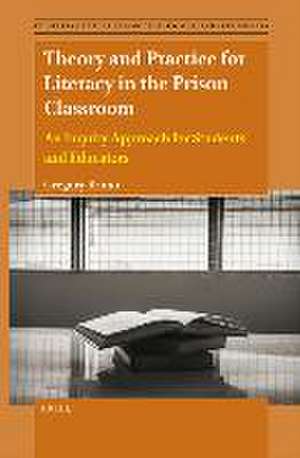Theory and Practice for Literacy in the Prison Classroom: An Inquiry Approach for Students and Educators: Studies in Critical Pedagogy, Theology, and Spirituality, cartea 1
Autor Gregory Brunoen Limba Engleză Paperback – 14 sep 2022
Preț: 281.97 lei
Nou
Puncte Express: 423
Preț estimativ în valută:
53.96€ • 56.13$ • 44.55£
53.96€ • 56.13$ • 44.55£
Carte indisponibilă temporar
Doresc să fiu notificat când acest titlu va fi disponibil:
Se trimite...
Preluare comenzi: 021 569.72.76
Specificații
ISBN-13: 9789004530676
ISBN-10: 9004530673
Pagini: 176
Dimensiuni: 155 x 235 mm
Greutate: 0 kg
Editura: Brill
Colecția Brill
Seria Studies in Critical Pedagogy, Theology, and Spirituality
ISBN-10: 9004530673
Pagini: 176
Dimensiuni: 155 x 235 mm
Greutate: 0 kg
Editura: Brill
Colecția Brill
Seria Studies in Critical Pedagogy, Theology, and Spirituality
Notă biografică
Gregory Bruno, Ph.D. (2019), Teachers College, Columbia University, is Assistant Professor of English and Co-coordinator of the Composition Sequence at Kingsborough Community College. He has designed and facilitated college-in-prison programs in New York, published on student debt, writing pedagogy, and community colleges, and contributed chapters on college-in-prison pedagogy.
Cuprins
Preface
Acknowledgements
1 Asking Meaningful Questions: Introducing an Inquiry into Carceral Pedagogy
1 What This Books Seeks to Do
2 Methodology: An Inquiry Stance
3 Letting Theory Guide Inquiry: Bridging Paulo Freire and Ernst Bloch
4 How This Book Is Organized
5 Opening the Conversation
2 Tracing the History of Carceral Learning: A History and the Politics of Teaching in American Jails and Prisons
1 Theoretical Context: Foucault and Althusser
2 The Origins of Mass Incarceration in America
3 Correlative Trends in Incarceration and Education
4 Relationship to Incarceration and Literacy
5 A History of College in Jails and Prisons
6 Current Trends in Carceral Education
7 Conclusion
3 Ernst Bloch and Paulo Freire: Toward Meaning in College in Prison Programming
1 The Purpose of Outlining a Methodology
2 Theorizing Carceral Pedagogy
3 Paulo Freire
4 Ernst Bloch
5 Bridging Paulo Freire and Ernst Bloch
6 The Nature of “Not Yet” and “Ideological Becoming” in Carceral Learning
7 Conclusion
4 Cultivating Blochian Warmth in Carceral Pedagogy
1 A Brief Biography of Ernst Bloch
2 Warm Stream Practices in Higher Education
3 Not Yet: Ernst Bloch and Hope
4 Abstract and Concrete Utopias
5 Colder and Warmer Streams
6 Conclusion
5 Thinking Critically about Critical Pedagogy: Considering the Role of Freirean Thought in the Prison Classroom
1 Reconsidering the Influence of Paulo Freire
2 Principles of Freirean Thought
3 Freire’s Theology
4 A Critique of Critical Pedagogy for Incarcerated Learners
5 The Relationship between Paulo Freire and Ernst Bloch
6 Applying Paulo Freire in a Carceral Pedagogy and College in Prison Programming
7 Conclusion
6 Carceral Pedagogy and Making Meaning: Seeking Purpose in the Prison Classroom
1 Meaning-Making in College in Prison Programming
2 Meaning-Making and Meaning-Makers
3 Constructivist Psychology
4 Stream Theory, Critical Pedagogy, and Making Meaning
5 How Do We Implement Meaning-Making Practices in Carceral Pedagogy?
6 Conclusion
7 A Pedagogy of Meaning-Making for Incarcerated Writers: Literacy as a Meaning-Making Practice
1 Liberal Arts and Literacy Practice in College in Prison Programming
2 Teaching Writing
3 Stream Theory and Meaning-Making for Literacy Pedagogies
4 Toward a Meaningful Literacy Pedagogy for Incarcerated Students
5 Conclusion
Index
Acknowledgements
1 Asking Meaningful Questions: Introducing an Inquiry into Carceral Pedagogy
1 What This Books Seeks to Do
2 Methodology: An Inquiry Stance
3 Letting Theory Guide Inquiry: Bridging Paulo Freire and Ernst Bloch
4 How This Book Is Organized
5 Opening the Conversation
2 Tracing the History of Carceral Learning: A History and the Politics of Teaching in American Jails and Prisons
1 Theoretical Context: Foucault and Althusser
2 The Origins of Mass Incarceration in America
3 Correlative Trends in Incarceration and Education
4 Relationship to Incarceration and Literacy
5 A History of College in Jails and Prisons
6 Current Trends in Carceral Education
7 Conclusion
3 Ernst Bloch and Paulo Freire: Toward Meaning in College in Prison Programming
1 The Purpose of Outlining a Methodology
2 Theorizing Carceral Pedagogy
3 Paulo Freire
4 Ernst Bloch
5 Bridging Paulo Freire and Ernst Bloch
6 The Nature of “Not Yet” and “Ideological Becoming” in Carceral Learning
7 Conclusion
4 Cultivating Blochian Warmth in Carceral Pedagogy
1 A Brief Biography of Ernst Bloch
2 Warm Stream Practices in Higher Education
3 Not Yet: Ernst Bloch and Hope
4 Abstract and Concrete Utopias
5 Colder and Warmer Streams
6 Conclusion
5 Thinking Critically about Critical Pedagogy: Considering the Role of Freirean Thought in the Prison Classroom
1 Reconsidering the Influence of Paulo Freire
2 Principles of Freirean Thought
3 Freire’s Theology
4 A Critique of Critical Pedagogy for Incarcerated Learners
5 The Relationship between Paulo Freire and Ernst Bloch
6 Applying Paulo Freire in a Carceral Pedagogy and College in Prison Programming
7 Conclusion
6 Carceral Pedagogy and Making Meaning: Seeking Purpose in the Prison Classroom
1 Meaning-Making in College in Prison Programming
2 Meaning-Making and Meaning-Makers
3 Constructivist Psychology
4 Stream Theory, Critical Pedagogy, and Making Meaning
5 How Do We Implement Meaning-Making Practices in Carceral Pedagogy?
6 Conclusion
7 A Pedagogy of Meaning-Making for Incarcerated Writers: Literacy as a Meaning-Making Practice
1 Liberal Arts and Literacy Practice in College in Prison Programming
2 Teaching Writing
3 Stream Theory and Meaning-Making for Literacy Pedagogies
4 Toward a Meaningful Literacy Pedagogy for Incarcerated Students
5 Conclusion
Index

